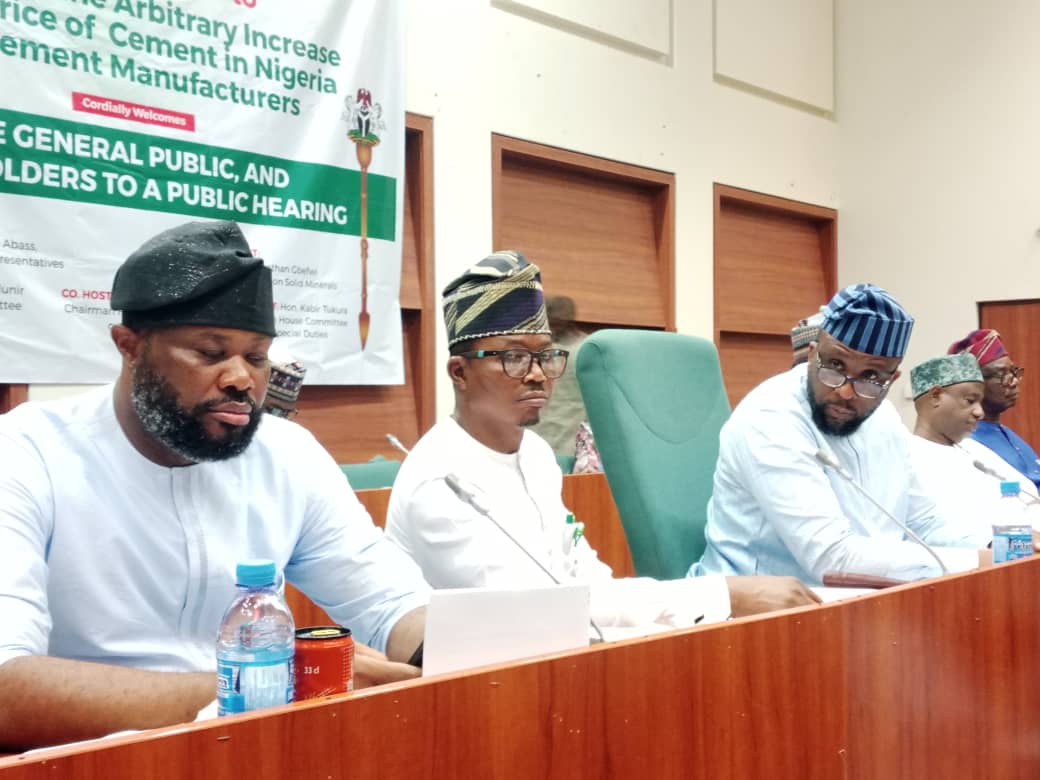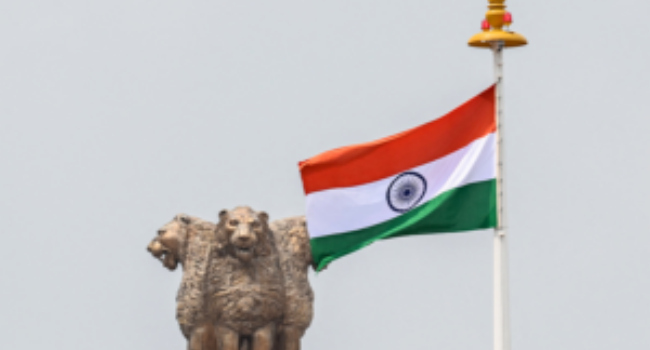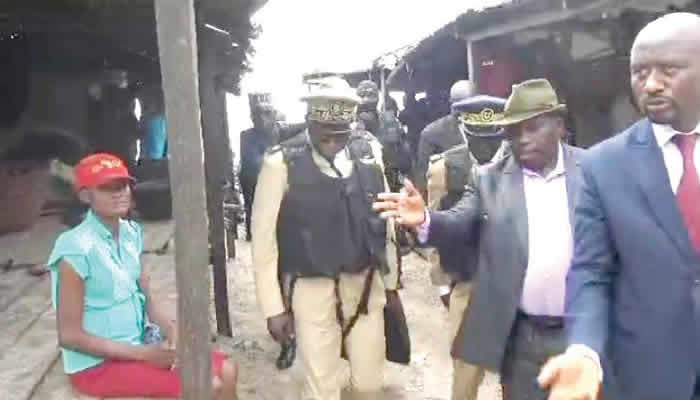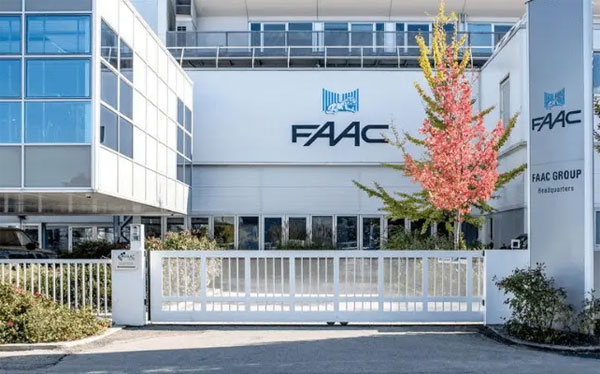News
Reps Issue 14-Day Ultimatum For Dangote, Lafarge, Bua, Eagle, Asaka Cement Companies To Appear

News
Indian man wakes up on funeral pyre

An Indian man awoke on a funeral pyre moments before it was to be set on fire after a doctor skipped a postmortem, medical officials said Saturday.
Rohitash Kumar, 25, who had speaking and hearing difficulties, had fallen sick and was taken to a hospital in Jhunjhunu in the western state of Rajasthan on Thursday.
Indian media reported he had had an epileptic seizure, and a doctor declared him dead on arrival at the hospital.
But instead of the required postmortem to ascertain the cause of death, doctors sent him to the mortuary, and then to be burned according to Hindu rites.
Singh, chief medical officer of the hospital, told AFP that a doctor had “prepared the postmortem report without actually doing the postmortem, and the body was then sent for cremation”.
Singh said that “shortly before the pyre was to be lit, Rohitash’s body started movements”, adding that “he was alive and was breathing”.
Kumar was rushed to hospital for a second time, but was confirmed dead on Friday during treatment.
Authorities have suspended the services of three doctors and the police have launched an investigation.
AFP
News
Why Cameroonian Authorities Detained Five Nigerian Pastors – Sources

Five Nigerian pastors and others residing in the Idabato II community of Cameroon, formerly known as the Bakassi Peninsula, have been arrested and detained by the Cameroonian authorities.
Their detention followed the kidnap of the community’s Divisional Officer, Ewane Roland, by armed men in early October.
A former chairman of the Yoruba community in the defunct Bakassi Peninsula, Eniola Alabo, disclosed this to The PUNCH during an interview.
Local media had reported that Roland, alongside another official of the council, Etongo Ismaeil, was whisked away on October 1, 2024, by gunmen who used a flying boat in the coastal area.
According to Alabo, the Cameroonian government blamed Nigerians in the area for Roland’s abduction and deployed soldiers to arrest them.
“The Gendarmerie came to the community and started shooting sporadically into the air on the day they arrested some of these Nigerians,” Alabo said.
The man explained that his compatriots in the troubled community called and explained that the incident had plunged them into panic and anxiety in the border town.
During the raid, some Nigerians, including Iseoluwa Eniola, Feran Ajimosun, Idowu Ajimosun, Abiola Ajimosun, Blessing Ajimosun, Sunny Bassey, Feran Samagbeyi, and Godwin were detained in Idabato II.
Governor locks down community
It was gathered that Cameroon’s South-West Governor, Bernard Okalia, visited Idabato on October 8, 2024.
He was said to have declared a total lockdown of the area, which had mostly Nigerians who were fishermen.
Okalia was said to have issued a 72-hour ultimatum to both Nigerians and Cameroonians in the community to produce Roland alive.
A clip of the visit, obtained by The PUNCH, showed him saying, “All shops are closed…the churches are closed till further notice. No exit, no entry in this whole Idabato.”
Alabo said Nigerians in the community were rendered economically handicapped, leading to hunger and frustration.
Residents, however, reportedly defied the governor’s order in the first week of November to go about their fishing business.
“They stayed at home doing nothing for three weeks. The people were hungry because their source of livelihood was put on hold. They had to go out to eat,” Alabo said.
The action was said to have angered the Cameroonian authorities, who deployed soldiers in Idabato on the 10th and 11th of November 2024 to arrest Nigerians in the community.
According to Alabo, the soldiers invaded the community and started shooting sporadically in the air, which made many Nigerians suffer varying degrees of injury.
Pastors arrested
During the lockdown imposed on Nigerians in Idabato II, churches were also locked.
But when Nigerians began attending to their normal activities, churches also opened on Sunday to Christians.
“Some soldiers invaded the Assembly Church of God in the area and arrested the Nigerian pastors there because they were told not to engage in any activities,” the Bakassi Peninsula ex-leader said.
“The names of the pastors arrested by Cameroonian soldiers that day were Adeleke Omoniye, Cascar Ubom, Etim Asuquo, Olamide Ayeye, and Umoh Atete.”
Buttressing the claims, one of the Nigerian leaders in Idabato, who identified himself as Johnson for security reasons, said the lives of the pastors were in danger.
Johnson said the pastors were whisked away by the Cameroonian soldiers to unknown places.
“The Cameroonian soldiers took the pastors away,” Johnson said. “A few days later, we heard that they have been released, but we’ve not seen them.”
The source also said the incident forced many people to relocate to neighbouring communities in Akwa Ibom and Cross River.
“We are in panic,” the source revealed. “The Cameroonian authorities have made life unbearable for Nigerians in Idabato. We have all the major tribes of Nigeria here. We have Yoruba, Hausa, Igbo, Efik, and other people.”
Woman dies
During the lockdown, a Nigerian woman, Esther Okon died after giving birth to a baby on the 20th of October, 2024.
Okon reportedly bled to death after giving birth as she could not receive any medical treatment from the hospital.
One of the executives of the Nigerian Union in Idabato, who spoke on condition of anonymity, disclosed this, adding that the woman had been in labour since 19th October.
The source said Okon would not have died if she had been transported to Ibaka in Mbo Local Government Area of Akwa Ibom State but there was no movement.
“It takes only two hours by a speedboat but if we see a flying boat, it is just 45 minutes to get her to Akwa Ibom,” the source said.
Confirming the incident, another Nigerian man, who claimed to be Okon’s husband’s friend and did not disclose his identity for security reasons, said her corpse was repatriated to Nigeria after some documents were signed with the Cameroonian authorities.
“The corpse was taken to Ibaka in Nigeria after her husband signed some papers with the Cameroonian government,” the source said.
Tax payments
One of the problems causing conflicts between the Cameroonian authorities and Nigerians in Idabato is the payment of taxes.
The authorities had accused Nigerian nationals in Idabato of evading taxes but proof of adherence to the payment of taxes was shown to them on many occasions, Johnson said.
“We have documents like receipts issued to us as evidence after the payments of taxes. It is called global tax collected annually,” the source added.
The PUNCH gathered that some of the taxes might not have been remitted to appropriate quarters.
Failed interventions
When asked about the possible intervention of the offices of Consulate-Generals of the two West African countries, the Nigerian nationals said their efforts had not yielded results.
“I have gone to the office of the Consulate-General of Cameroon in Nigeria, but nothing happened. I was not allowed to see the woman. I learned that she is a new person appointed,” Alabo said.
All efforts to reach the Consulate-General of Cameroon in Nigeria were futile as both numbers and email addresses on their website appeared dormant as of the time of filing this report.
NiDCOM reaction
Meanwhile, the Nigerians in Diaspora Commission disclosed to The PUNCH that the matter was for the consular division of the Ministry of Foreign Affairs to handle.
While explaining why it was not in the jurisdiction of the NiDCOM, the commission’s Head of Media, Abdur-Rahman Balogun said the issue now involved Nigeria and Cameroon.
“NiDCOM only engages in matters relating to Nigerian individuals in the diaspora,” Balogun said. “This case is between two governments. It should be handled by the consular office.”
“Moreover, I am not aware of the incident,” NiDCOM spokesman added.
The efforts to reach the Ministry of Foreign Affairs concerning the issue did not yield result as the number was not connecting.
A message was sent to the email address of the ministry but there was no response as of the time of filing this report.
In 2002, the International Court of Justice awarded the oil-rich Bakassi Peninsula to Cameroon.
On June 12, 2006, former President Olusegun Obasanjo and Cameroonian President Paul Biya signed the Greentree Agreement, which outlined the withdrawal of Nigerian troops and transfer of authority.
Some Nigerians left the community to move to the coastal areas belonging to Nigerian states namely Cross River and Akwa Ibom.
Meanwhile, about 50,000 Nigerians are still residents of the Bakassi Peninsula, claiming that the now Idabato community remains their ancestral home despite being under the control of Cameroon.
PUNCH
News
FG insists Rivers State funds is intact was never stopped

The Federal Government has not stopped disbursement of funds to Rivers State contrary to reports on some online platforms on Friday.
Mr. Bawa Mokwa, Director of Press in the office of the Accountant General of the Federation told the Saturday Tribune that “disbursement of October allocation to states and local governments by FAAC is ongoing.”
He explained that “Rivers State will benefit because of a subsisting appeal/stay of execution order.”
Meanwhile, the Court of Appeal, Abuja Division on Friday, reserved judgements in five separate appeals arising from the judgements of a Federal High Court in Abuja on the Rivers State government political crisis.
One of the appeals is against the judgement of the High Court which stopped the Central Bank of Nigeria (CBN) from releasing federal allocation to Rivers State.
The presiding Justice of the Court of Appeal, Abuja Division, Justice Hamma Barka reserved the judgements to a date that would be communicated to the parties after all processes filed in the appeals were adopted by counsel.
The appeals are, CA/ABJ/CV/ 1277/2024, CA/ABJ/CV/ 1303/2024, CA/ABJ/CV/1293/2024, CA/ABJ/CV/1287/2024 filed against the judgements of the Federal High Court, Abuja delivered on October 30, 2024 and appeal number, CA/ABJ/CV/ 1196/2024 against the judgement delivered by same Federal High Court on October 2, 2024.
Earlier, while adopting his briefs of argument in the appeal, Yusuf Ali, SAN representing the Governor of Rivers state, Siminalayi Fubara in appeal number CA/ABJ/CV/1303/2024 prayed the court to consolidate the five appeals, a request the court granted.
It would be recalled that Justice Joyce Abdulmalik of a Federal High Court, Abuja had, in a judgement delivered on 30th October stopped the Central Bank of Nigeria (CBN) from further releasing monthly financial allocations to Rivers State government.
The court held that the receipt and disbursement of monthly allocations since January this year by Governor Fubara is a constitutional summersault and aberration that must not be allowed to continue.
Justice Abdulmalik who issued the order in a judgment in the suit filed by the Rivers State House of Assembly and Rt Hon. Martin Chike Amaewhule as its Speaker, held that the presentation of the 2024 budget by Fubara before a four-member Rivers State House of Assembly was an affront to the constitutional provision.
The Judge specifically held that Fubara’s action in implementing unlawful budget smacked gross violations of the 1999 Constitution he swore to protect and consequently restrained the apex bank, the Accountant General of the Federation, Zenith Bank and Access Bank from further allowing Fubara to access money from the Consolidated Revenue and Federation Account.
Justice Abdulmalik held that the action of the four-member Rivers State House of Assembly being held on to by Governor Fubara as yardstick to justify unlawful budget had since been nullified and set aside by the Federal High Court, Abuja and the Court of Appeal, Abuja Division.
According to the Judge, the judgment of the Rivers State High Court, which gave power to the governor to implement the 2024 budget, had also been set aside by the Court of Appeal.
She said, the Appropriation Bill for January to December 2024, being operated by the 5th defendant (Fubara), having not been passed by the lawful House of Assembly is illegal unlawful and subversion of the 1999 Constitution.
According to the Judge, “It is mandatory to present Appropriation Bills before the appropriate Houses of Assembly before legitimate disbursement and withdrawal can be made.
She also issued another order of injunction which restrained Fubara, Accountant General of the state and their agents from authorizing the withdrawal of money from the Rivers state bank accounts domiciled at the Zenith Bank and Access Bank until the budget of the state is passed by the appropriate House of Assembly.
The suit, which has the Rivers State House of Assembly and Rt Hon Martin Chike Amaewhule as plaintiffs, has the CBN, Zenith Bank, Access Bank, Accountant General of the Federation, Rivers State governor, Accountant General of Rivers, Rivers State Independent Electoral Commission, Hon Justice S. C. Amadi, Chief judge of Rivers state, Justice Adolphus Enebeli, chairman of RSIEC and Rivers State government as defendants.
-

 News18 hours ago
News18 hours agoReps Demand Details Of Project Undertaken From Ministry Of Solid Minerals In 2024 Budget
-

 News23 hours ago
News23 hours agoSimon Ekpa to Face Extradition, DHQ Declares
-

 News23 hours ago
News23 hours agoFilling stations set to adjust pump price as petrol crashes by over N300
-

 Education22 hours ago
Education22 hours agoBREAKING! END of road for Fubara as FG halts allocation
-

 News23 hours ago
News23 hours agoOil theft: DHQ rubbishes Tompolo’s allegation against Navy
-

 News23 hours ago
News23 hours agoSEE Black Market Dollar (USD) To Naira (NGN) Exchange Rate Today, 22 November 2024
-

 News18 hours ago
News18 hours agoPDP leaders, critical stakeholders endorse Hon. Teejay Yusuf for National Chairman
-

 News22 hours ago
News22 hours agoEnugu ready to provide evidence against Ekpa, hails arrest








